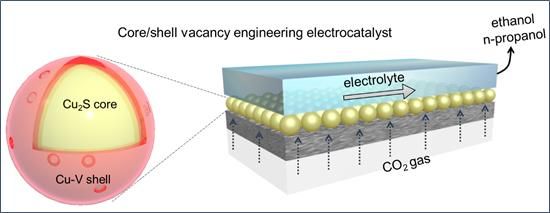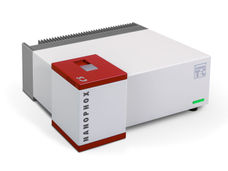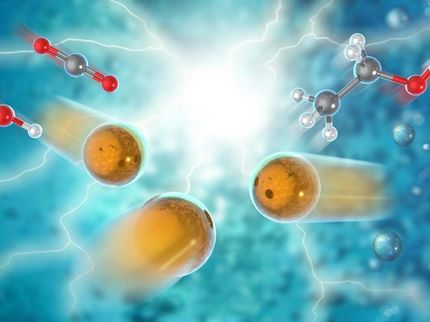Catalyst upgrades carbon dioxide to fuels
Liquid multi-carbon alcohols such as ethanol and n-propanol are desired as renewable transportation fuels. They offer high energy densities, ease of long-range transport, and direct drop-in usage in existing internal combustion engines. Engineering catalysts that favor high-value alcohols is desired.

Core/shell-vacancy engineering (CSVE) catalyst enables efficiently electrochemically reducing CO2 to multi-carbon alcohols.
ZHUANG Taotao
A research team led by professor Yu Shuhong from University of Science and Technology of China of Chinese Academy of Sciences and Edward H. Sargent from the University of Toronto has uncovered a catalysis strategy intermediates during CO2 electrochemical reduction reaction, which sheds new lights on upgrading CO2 to engine fuels.
When it comes to designing catalysts for CO2 conversion, many types of research on the C-C coupling step have been done; while little attention has been paid to post-C-C coupling reaction.
By deliberately incorporating sulfur atoms into the catalyst core and copper vacancies in its shell, researchers realized Cu2S-Cu-V core-shell nanoparticles that enhance CO2 reduction to ethanol and propanol. Structural characterization, x-ray studies, and electrochemical measurements were utilized to illustrate how good this new catalyst is in improving catalytic performance.
This discovery will inspire the design of efficient catalysts that produce higher-carbon liquid alcohols. In addition to addressing the need for long-term storage of renewable electricity and decarbonization of the transportation sector via electrocatalytic reduction of CO2 to chemical feedstocks.
Original publication
Other news from the department science
These products might interest you

NANOPHOX CS by Sympatec
Particle size analysis in the nano range: Analyzing high concentrations with ease
Reliable results without time-consuming sample preparation

Eclipse by Wyatt Technology
FFF-MALS system for separation and characterization of macromolecules and nanoparticles
The latest and most innovative FFF system designed for highest usability, robustness and data quality

DynaPro Plate Reader III by Wyatt Technology
Screening of biopharmaceuticals and proteins with high-throughput dynamic light scattering (DLS)
Efficiently characterize your sample quality and stability from lead discovery to quality control

Get the chemical industry in your inbox
By submitting this form you agree that LUMITOS AG will send you the newsletter(s) selected above by email. Your data will not be passed on to third parties. Your data will be stored and processed in accordance with our data protection regulations. LUMITOS may contact you by email for the purpose of advertising or market and opinion surveys. You can revoke your consent at any time without giving reasons to LUMITOS AG, Ernst-Augustin-Str. 2, 12489 Berlin, Germany or by e-mail at revoke@lumitos.com with effect for the future. In addition, each email contains a link to unsubscribe from the corresponding newsletter.



























































